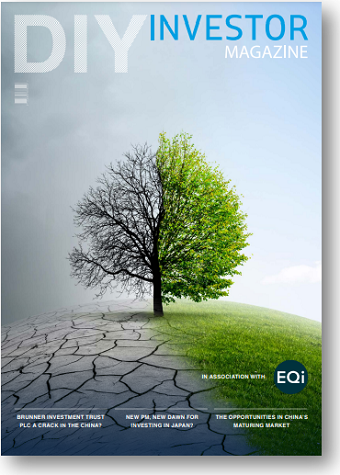Dec
2021
A Crack in the China? Brunner Investment Trust PLC
DIY Investor
2 December 2021


 The following is an extract from the latest instalment of Connected Investor, the podcast from the Brunner Investment Trust, featuring host Joe Lynam discussing some of the issues of the day with the Trust’s lead portfolio manager, Matthew Tillett.
The following is an extract from the latest instalment of Connected Investor, the podcast from the Brunner Investment Trust, featuring host Joe Lynam discussing some of the issues of the day with the Trust’s lead portfolio manager, Matthew Tillett.
Joe Lynam (JL): We’re going to take a deeper look at China, where there appears to be a big shift by the ruling Communist party this year. For three decades it looked the other way as some citizens became billionaires, so long as jobs were created and no one strayed into politics. Suddenly that blind eye has opened, and we’ve seen swift action against high profile millionaires and even entire sectors within the Chinese economy. President Xi Jinping refers to it as his ‘common prosperity drive’. What do you make of it, Matthew?
Matthew Tillitt (MT): I think the government has become increasingly concerned, not so much with its pace, but with the path of economic growth in China; it’s become unbalanced, accentuating inequalities in society. They have a tacit understanding with the population that they stay in power and everybody gets wealthier over time and living standards improve.
‘They stay in power and everybody gets wealthier over time’
If it starts to look like that’s only happening for segments of the population, the lower and middle classes become disaffected. That’s potentially a major problem for them and their mandate to rule the country; I think that’s what’s behind some of these rulings and changes in policy and regulation.
JL: But to the outside world, Matthew, it looks as if China is tilting away from being a relatively open, albeit politically Communist country, in order to protect the ordinary man and woman on the street.
MT: There definitely is an element of that going on, although how open was it before really? Government has always been in control of pretty much every sector and really every company as well. Even big technology companies that you can invest in as Western investors, when you buy those shares via ADRs (American Depository Receipts), or even listings in Hong Kong, most are structured such that you don’t have property rights in the way that you do buying a share in the UK or in the US.
JL: You don’t own the shares that you’re buying?
MT: They use complex structures called Variable Interest Entities, which work like a tracker share in that the shares track the value of the company, but there’s no way of enforcing your right to that property. Investors have been prepared to look through this on the assumption that the Chinese government would never expropriate property from foreign investors.
JL: And can we continue to make that assumption, Matthew?
MT: They need to find a balance because they need the outside world as well; never say never, but if government started doing things like that, they would have a real problem attracting inward investment, buying goods and services from around the world, using technologies from other parts of the world, which they want, and need to do. They are integrated into the global economy, so I think it’s unlikely that that would happen, but it leads into a broader question around investing in China and how one takes these factors into account. In Brunner we’ve not typically had much exposure to China; not because we haven’t looked hard or haven’t been interested, but because we’ve always struggled with this issue and particularly governance – it’s hard to find companies that have the standards that we look for. This episode has shown that you don’t have the same protections you have in other parts of the world and therefore if you’re going to invest you’ve got to put a discount on it; the question is how much of a discount. Before this started there wasn’t much, now there is a very big discount. You can on paper buy some, what look like, very interesting companies, for example some technology performers in China that have very rapid growth and excellent long-term growth prospects on really attractive valuations now, and so that’s potentially an opportunity. But you’ve just got to decide how much of a discount you want to place for these issues.
JL: So how much of a discount would you give, for example, the property company Evergrande?
MT: Evergrande is slightly different and of course is the other issue happening in China at the moment. It is a very big company in terms of its balance sheet and the impact it has on the economy, because it’s the largest real estate developer, but the equity is enormously financially leveraged and it will almost certainly need some sort of complicated financial rescue from the government to get it out of the situation that it’s in.
‘It will almost certainly need some sort of complicated financial rescue from the government to get it out of the situation that it’s in’
Evergrande illustrates the conflict that has existed within the Chinese growth model for probably 10 or 15 years now; on the one hand the government has this tacit agreement with the population to basically double living standards every 10 years, and that needs maybe 6 or 7% economic growth, but at the same time the government also wants growth to be ‘reliable’ – that’s the term they use, we call it ‘sustainable growth’ in the West – which is growth driven by consumption, increases in consumer wealth and spending, and technology as well, as opposed to just building more bridges or apartments. However, economic history tells us it’s very, very difficult to achieve that sort of growth at rates at more than 2 or 3%; so every time they look like they’re not getting near the 6 or 7%, government relaxes the rules and you get these property and infrastructure booms, but then they row back on it, as they have recently, when they want to stop it, which creates problems for companies like Evergrande. It is an inherent conflict, and can’t go on forever; at some point the country will have to move to a lower growth path – that’s my view.
JL: The danger with that is that the West has become addicted to Chinese investment and Chinese growth; what will the realignment I spoke about mean for the markets and what will it mean for the West? Could the decoupling of China from the West – if it is a decoupling – lead to a surge in inflation, for example?
MT: I guess it depends to what extent it happens. If you’re talking about Evergrande being the catalyst for China’s growth to decelerate from 7% to 1 or 2% forever, that’s a very significant event for financial markets, because it would have significance for everything from commodity prices and commodity markets, to luxury goods and industrial companies that sell into China; it’s just such a big market that everyone’s assuming is going to grow more than all the other markets around the world. Personally, I’m not sure Evergrande is the catalyst for that; I suspect the government has a plan of some sort of rescue, getting other private and public property companies to take on the liabilities. But you cannot keep on piling on debt forever, eventually the growth rate does have to slow, and we need to be prepared for that as investors; I’m not sure Evergrande is the catalyst for that to happen right now. Inflation is definitely something to be aware of; if you look at the low rates of inflation we’ve had over 20 or 30 years, a chunk of that is a result of globalisation and in particular the entry into the workforce of hundreds of millions of Chinese labourers who moved from the country into the city, which really started happening in the ‘90s and then carried on. This is the classic emerging market, export-led growth model where you bring low cost labour into the workforce and slowly move up the value chain driving growth by exporting goods into the Western countries; you do it at a lower cost than anyone else can do it, which works for a long time. The effect is quite deflationary, and that’s what we’ve seen happen: the price of tradable goods has been deflationary for a long time, and that’s why we see low rates of inflation in Western countries, because you have tradable goods prices which are flat or declining and then domestic service prices – the price of your haircut, the price of your train ticket – going up, and it’s the average of the two which is the inflation number that we see.
‘Labour costs have gone up so much in China that the economics don’t stack up in the way they used to’
Going forward, we won’t have that same deflationary force because the labour costs arbitrage doesn’t exist in the way that it existed before; labour costs have gone up so much in China that the economics don’t stack up in the way they used to. That’s why we’re seeing companies re-shore their supply chains back to the US and Europe, because it makes sense; I don’t think that’s going to lead to a surge in inflation, but I certainly think it’s less deflationary than we have become accustomed to over the last 10 or 20 years.
JL: Let’s talk about the surge in energy prices. In the UK we’ve seen queuing for petrol and diesel, which may be more closely related to Brexit and the lorry drivers who’ve gone back to Europe following the full exit of Britain from the EU, but energy prices have risen all over the world, which could have an impact, especially on inflation.
MT: You’re right, they have risen a lot; there are two things going on – short-term issues, which may resolve themselves, but also longer-term factors. In the short term we’re seeing recovering demand all around the world as economies reopen, but also peculiarities such as gas storage where levels are unusually low; we’ve also had a poorer period for renewables, particularly here in the UK where the wind just hasn’t been blowing. That may sound flippant but it illustrates one of the problems; the PM has put a lot of weight on wind power being how we’re going to decarbonise and I’m supportive of that, but it is an intermittent source of energy and when it’s not available, until we have reliable scale storage solution, we will be vulnerable to these situations. It doesn’t take much; demand is very inelastic for energy, so even a small shortage and suddenly prices go up enormously to ration demand. Longer term, there has been a real lack of investment in this industry; starting around 2014, we had a crash in oil and gas prices driven by the growth of US shale and then the decision by OPEC to effectively try and out-compete shale. That was really a regime change for the fossil fuel industry, because it changed its whole pricing dynamic and it had to change the way it behaved.
‘Demand is very inelastic for energy, so even a small shortage and suddenly prices go up enormously to ration demand’
The previous 10 years had been an investment boom, where they’d spent loads of money on new projects, many of which proved uneconomic, or made very low returns; since then the industry’s been much more focused on financial metrics like return on capital. Shareholders have held companies to account as well, and so there hasn’t really been the same level of investment. It takes a long time because projects can take 5-10 years to fully come online, so it’s only really now that we’re coming to the end of some of those big projects that were sanctioned in 2012/14. Looking forward we don’t really have much new supply coming on and demand is still very resilient and recovering; to me, that point is more of a concern. The shorter-term issues will probably work themselves out, but the longer-term questions are harder to correct without new investment. On top of that we have the ESG dimension as well – listed fossil fuel companies in Europe are basically no longer investing in new fossil fuels because they need to transition their businesses away. It’s a bit of a wake-up call for everyone because it shows that we are still reliant on these sources of energy and if we pretend we’re not, the danger is we end up in these situations. When the public sees gas bills go up 50% or 100%, they may not be as supportive of some of the policies that we need; I think everybody needs to be that bit more practical about the situation and the challenge that we face.
JL: Do you think interest rates – American, European, or British – are heading north as a result of the pressures that we’ve already spoken about?
MT: I’m not sure they’ll go north because of these pressures as the central bank’s mandate focuses on ‘basic inflation’, excluding all of these things. They don’t really respond to supply-side driven shocks; it’s more demand-side. Most of this stuff is supply-side driven, and that’s the narrative that they’re talking about now – it all being transitory, and only the passage of time will tell if that’s the case. In my view quite a bit of it is transitory, but not all; I think some of it is probably here to stay, and therefore we probably do have slightly higher levels of inflation than we’ve had in the past. Whether that leads to materially higher interest rates is another question though because every time central banks have tried to raise interest rates ever since the financial crisis, it’s not really worked; and that may well happen again, in which case we may not get very far down the road of raising interest rates before they have to be cut again.
You can listen to the full podcast at www.brunner.co.uk/podcast/ or search ‘Connected Investor’ on your usual podcast platform.
Find out more about Brunner Investment Trust PLC here >
To buy this trust login to your EQi account
Select the Brunner Investment Trust – GB0001490001

All sources Allianz Global Investors GmbH unless otherwise noted. This is no recommendation or solicitation to buy or sell any particular security. A security mentioned as example above will not necessarily be comprised in the portfolio by the time this document is disclosed or at any other subsequent date. Investing involves risk. The value of an investment and the income from it may fall as well as rise and investors may not get back the full amount invested. Past performance is not a reliable indicator of future results. The views and opinions expressed herein, which are subject to change without notice, are those of the issuer and/or its affiliated companies at the time of publication.
This is a marketing communication issued by Allianz Global Investors GmbH, an investment company with limited liability, incorporated in Germany, with its registered office at Bockenheimer Landstrasse 42-44, D 60323 Frankfurt/M, registered with the local court Frankfurt/M under HRB 9340, authorised by Bundesanstalt für Finanzdienstleistungsaufsicht (www.bafin.de). Further information on Investor Rights are available here (www.regulatory.allianzgi.com). Allianz Global Investors GmbH has established a branch in the United Kingdom, Allianz Global Investors GmbH, UK branch, 199 Bishopsgate, London, EC2M 3TY, www.allianzglobalinvestors.co.uk, deemed authorised and regulated by the Financial Conduct Authority. Details of the Temporary Permissions Regime, which allows EEA-based firms to operate in the UK for a limited period while seeking full authorisation, are available on the Financial Conduct Authority’s website (www.fca.org.uk). Details about the extent of our regulation by the Financial Conduct Authority are available from us on request. The Brunner Investment Trust PLC is incorporated in England and Wales. (Company registration no. 226323). Registered Office: 199 Bishopsgate, London, EC2M 3TY.
Commentary » Investment trusts Commentary » Investment trusts Latest » Latest » Mutual funds Commentary » Uncategorized

Leave a Reply
You must be logged in to post a comment.